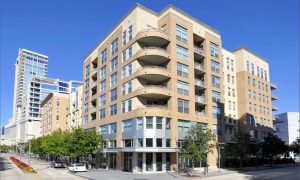 Apartment living has some unique challenges in terms of security. For one, you’ll be living in a more condensed environment, making it difficult to detect strangers. There’s the loss of control of the exterior – you don’t have the ability to easily modify the perimeter or detection zones. The landlord or building owner is responsible for those areas. Still, don’t jump to the conclusion that your first line of defense is your front door! You still have some control over many of the security variables and are a key component of the apartment building’s perimeter and detection zone’s early warning system. Let’s take a look at some of the things you can to do improve your security in apartment living.
Apartment living has some unique challenges in terms of security. For one, you’ll be living in a more condensed environment, making it difficult to detect strangers. There’s the loss of control of the exterior – you don’t have the ability to easily modify the perimeter or detection zones. The landlord or building owner is responsible for those areas. Still, don’t jump to the conclusion that your first line of defense is your front door! You still have some control over many of the security variables and are a key component of the apartment building’s perimeter and detection zone’s early warning system. Let’s take a look at some of the things you can to do improve your security in apartment living.
Selecting an Apartment
Prior to even visiting an apartment building or considering whether to live in it, do a remote reconnaissance of them. Visit websites like Raidsonline.com, MyLocalCrime.com, CrimeReports.com, CrimeMapping.com, and SpotCrime.com to see the confirmed reports of local crime. Note the types of crimes, their frequency, and how recently they occurred.
You may also want to check the sexual offender database to assess your vulnerability in that area. Check out Family WatchDog, the Department of Justice’s National Sex Offender Database, or the Federal Bureau of Investigation’s Sex Offender Registry.
You may even want to do a map reconnaissance to see if the apartment is located near hospitals, police stations, fire stations, and emergency rooms. While looking at the map it would be good time to look at the routes you’d have to take to and from work or other places you frequent. If you have favorite grocery stores, restaurants or other hang outs you can see if the routes require you to pass through any bad or high risk areas. All of these things will factor into your security formula.
Further Reducing Your Risk
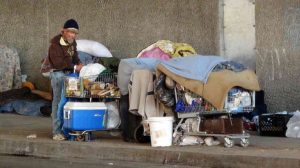 After ruling out apartments that rated too high on your risk scale, it’s time to do a boots-on-the-ground reconnaissance of the apartment complex as well as the surrounding area. Before stepping foot on the apartment grounds, take note of the surrounding neighborhood, streets, lighting, police patrols, cleanliness, and other “atmospherics” of your possible future home. Consider that you may be walking around in the neighborhood after dark and ask yourself if you’d feel safe. Are the street lights in good repair? Don’t limit your recon to just what you can see, but what can you hear? Is there a lot of background noise like police sirens, car alarms, ambulances, or fire engines? Are there police call boxes or emergency phones every 100 meters or so? Make note of the inhabitants and what they are doing. Are people hanging out on street corners, shuffling through alleyways, or sleeping on benches? How are they dressed and groomed? Is there a lot of vehicle traffic, people walking around, or families out for a walk pushing baby strollers? All of these are strong indicators of the overall security of a neighborhood and the confidence the inhabitants have in their own safety.
After ruling out apartments that rated too high on your risk scale, it’s time to do a boots-on-the-ground reconnaissance of the apartment complex as well as the surrounding area. Before stepping foot on the apartment grounds, take note of the surrounding neighborhood, streets, lighting, police patrols, cleanliness, and other “atmospherics” of your possible future home. Consider that you may be walking around in the neighborhood after dark and ask yourself if you’d feel safe. Are the street lights in good repair? Don’t limit your recon to just what you can see, but what can you hear? Is there a lot of background noise like police sirens, car alarms, ambulances, or fire engines? Are there police call boxes or emergency phones every 100 meters or so? Make note of the inhabitants and what they are doing. Are people hanging out on street corners, shuffling through alleyways, or sleeping on benches? How are they dressed and groomed? Is there a lot of vehicle traffic, people walking around, or families out for a walk pushing baby strollers? All of these are strong indicators of the overall security of a neighborhood and the confidence the inhabitants have in their own safety.
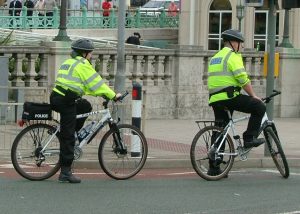 Take notice of any police patrols that pass you while doing your recon. Are the police in cars, on bicycles or on foot? It’s rare to see police patrolling on foot nowadays, but bike patrols are a strong indication that law enforcement is committed to security of the neighborhood. If you have a chance, flag one of them down and explain that you’re thinking about moving into the neighborhood and ask for his or her opinion of the area. Ask about the types and numbers of crimes, being especially attentive to the number of assaults, drunk and disorderly arrests, muggings, drug arrests, prostitution, car break-ins, and breaking and entries. These are statistics that indicate a high threat of low-level crime and raise your risks considerably. If you can’t find a bicycle cop, go to where cops hang out: the local precinct. Ask the desk officer the same questions, but expect that he’ll hand you off to the public affairs officer. Later, buy a local paper and go through the local crime reports and compare what you read to what people are telling you.
Take notice of any police patrols that pass you while doing your recon. Are the police in cars, on bicycles or on foot? It’s rare to see police patrolling on foot nowadays, but bike patrols are a strong indication that law enforcement is committed to security of the neighborhood. If you have a chance, flag one of them down and explain that you’re thinking about moving into the neighborhood and ask for his or her opinion of the area. Ask about the types and numbers of crimes, being especially attentive to the number of assaults, drunk and disorderly arrests, muggings, drug arrests, prostitution, car break-ins, and breaking and entries. These are statistics that indicate a high threat of low-level crime and raise your risks considerably. If you can’t find a bicycle cop, go to where cops hang out: the local precinct. Ask the desk officer the same questions, but expect that he’ll hand you off to the public affairs officer. Later, buy a local paper and go through the local crime reports and compare what you read to what people are telling you.
Taking a Tour
Hopefully you’ve narrowed down the list of possibilities to something manageable. Now it’s time to visit the apartments themselves. Most require an appointment, but some of the larger ones have an on-site full time staff and allow walk-in tours.
During your tour remember that your guide’s job, and possibly commission, depends on convincing you to sign a contract, so treat everything they tell you with a high degree of skepticism. Don’t be tempted by offers of move-in discounts, free cable, or whatever they throw in for an immediate signing. Those things will be available no matter when you make your decision.
Your assessment begins as you approach the apartment property. This is your perimeter zone. Where do visitors park their vehicles? Is it restricted or controlled in any way? Is the guest parking area covered by either video surveillance or guards? Is the area clear of vegetation and well-lit? Remember, this is where your friends and family will be parking when they come to visit. They could be leaving after dark so a well-lit, vegetation-free, attended parking area is preferable.
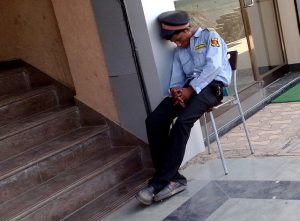 As you enter the building remember that this is your detection zone. Can you simply walk right in off the street or is there some security screening in place? Most buildings allow you to enter the main lobby, but then you’ll find yourself facing a guard or other security measure. When you walk in be on the lookout for security cameras, attentive staff and alert guards. These are your detection zone early warning systems. Pay attention to how the guards act and what they actually do to assess their effectiveness. Hopefully they’ll be logging people in and out, paying attention to their surroundings, checking IDs, and interacting with visitors. Do the guards appear attentive, well trained and groomed? Is their demeanor short or curt, or are they open, engaging and friendly. Observe how they greet residents passing through the lobby. Do they greet them by name, grunt “hey” or ignore them entirely, indicating possible animosity? These are all indicators of how effectively your detection zone detectors are working.
As you enter the building remember that this is your detection zone. Can you simply walk right in off the street or is there some security screening in place? Most buildings allow you to enter the main lobby, but then you’ll find yourself facing a guard or other security measure. When you walk in be on the lookout for security cameras, attentive staff and alert guards. These are your detection zone early warning systems. Pay attention to how the guards act and what they actually do to assess their effectiveness. Hopefully they’ll be logging people in and out, paying attention to their surroundings, checking IDs, and interacting with visitors. Do the guards appear attentive, well trained and groomed? Is their demeanor short or curt, or are they open, engaging and friendly. Observe how they greet residents passing through the lobby. Do they greet them by name, grunt “hey” or ignore them entirely, indicating possible animosity? These are all indicators of how effectively your detection zone detectors are working.
As you’re walking through the apartment complex try to absorb the atmospherics. What is your overall impression of the maintenance and upkeep? How clean are the common areas? Do the doors to common areas open and close properly or are they misaligned or damaged? Take some of the stairways and assess how clean and well-lit they are. Are there fire alarms located throughout and do they appear in good repair? These are all indicators of how committed the management is to maintaining the building and the safety of their residents.
Take a few moments and look at the fire escapes. In most buildings these are simply stairwells that have an exterior door on the ground floor. This is a critical area to pay attention to because if the exterior door isn’t secured well and under video surveillance, it’s a perfect point of entry for intruders. Make sure the ground exit door has a panic bar opener that you can find intuitively if the stairwell was filled with smoke. Is the fire door alarmed? How will security respond if the door alarm is triggered? Obviously you’ll have to ask this question rather than trigger the alarm… If possible, take a look at the door from the outside to see if it’s good shape, or damaged from repeated entry attempts. Make sure that once the door closes there’s no way to re-enter. Ensure that the lights in the stairwell have battery backups, guaranteeing they’ll work during a power failure or fire emergency.
As your escort shows you the apartment’s amenities try to spot any surveillance cameras along your route. Ideally, the main intersections, elevator doors, hallways, and sitting areas will have some level of video coverage. Ask how the video is monitored, where the screening takes place, and how long recordings are retained. If a crime ever occurs, this will be valuable evidence. Also notice how your guide greets passing residents and how they react to the meeting. Do the residents initiate the greeting and conversation in a friendly, casual way or do they appear shocked that your guide even spoke to them? During your visit you’ll probably have a chance to meet and talk to residents, so use it as a chance to gather a little intelligence. “Hey, I’m thinking about renting here, how do you like it?” or “When was the last break-in?”, instead of “if” there was a break-in. Residents have no incentive to lie to you, so weigh their comments and opinions highly.
When your escort takes you to the potential apartment this is the beginning of your interior zone. No, you don’t actually own the space yet but hopefully anyone getting to this point will have had to pass through a number of security checks. If you have elevators, do they require some sort of authentication to reach certain floors or can you just push a button and go wherever you like? Most require that you either present a magnetic card or punch in a code to access only your authorized floor, and possibly common areas, such as rooftop gardens or pools. Many elevators have video surveillance as well. When you arrive at the proper floor, is the hallway well-lit? Is there a video camera recording your arrival on the floor? As you walk down the hall, is it noisy or quiet? Do the hallways have thick, padded carpets that muffle noise, or something thin allowing you to hear every step as you pass? Ideally, your potential apartment is mid-way down the hallway, between the elevator and fire exit stairwell. That location is more energy efficient, and buffers you from machinery noises as well as loud people entering and exiting the elevators. Putting distance between your apartment door and the fire exit is simply a game of statistics. That distance reduces the door noises and echoing voices of people using the stairs. It also slightly reduces your risk because intruders coming up the fire exit will be in a hurry and are more likely to hit the apartments nearest the exit.
While in the hallway check the fire exit to make sure it closes securely and can’t be opened from inside the stairwell (make sure your guide stays in the hallway or you’ll find yourselves walking back to the ground floor and starting your tour all over again). You don’t want the fire exit to be a two-way door. You should be able to exit, but not re-enter once the door closes behind you. If you find the fire exit propped open, chances are that one of the floor’s residents uses the stairs regularly to go up and down. This represents a risk because the open fire door is a possible entry point for intruders. You have choices if you move in, but none of them are good. You can simply remove the obstructions when you find them and close the door. Alternately, you can find out who is doing it and confront them or report them to management. You could also post a sign saying that according to fire codes the door must remain closed. No matter which route you choose, you’ll probably alienate one or more of your new neighbors.
The apartment tour is mostly a formality. Yes, it’s your future interior zone, but you can modify almost everything after you move in. Security-wise there are a few things to look for though. You don’t want an apartment on the ground floor because you’ll need to worry about every single window in the apartment. An apartment on the 2nd or 3rd floor would be ideal because it’s too high for intruders to gain access, yet low enough so you can jump if necessary. Apartments higher than the third floor have potential egress problems, so factor that into your decision and make sure fire exits are easily accessible. Also, you DON’T want the top apartment because most buildings have a crawlspace between the apartment and roof. Intruders gaining access to the crawlspace will have an easy time cutting a hole through the ceiling, ransacking your apartment and simply walking out your door and down the fire escape.
Ensure your door is made of steel, not wood. Check the entrance door carefully for evidence of forced entry – dents, pry marks, or scraped paint along the frame, etc. Finding these would be a very bad sign and reason to cross the apartment off your list of potential homes. Make sure the door knob is sturdy and securely latched into the steel frame. Don’t worry about the lock too much unless the escort tells you that you can’t change it. Many apartments have their tenant’s doors master keyed so they can get in to perform maintenance or for emergencies. If this is true, it really isn’t a deal-breaker because there are other things you can do to protect yourself.
Another concern are any sliding glass doors on the balcony. While unlikely that your upstairs or downstairs neighbors will climb onto your balcony and enter through your sliding glass doors, it’s a possibility. Verify that the doors are well fitted in their tracks and have some kind of locking mechanism. As long as the doors are good quality, don’t worry too much about the locks because you can easily upgrade them later if you decide to move in.
Most people never think of this, but ask to take a look at the laundry room if the complex has one. Laundry rooms are usually in the basement, are unguarded with only one way in and out. For a criminal, this is the perfect place to “work”. They know people have their hands full when they arrive, are carrying at least a little cash, and their apartment and car keys. They simply lie in wait, jump the unsuspecting victim, subdue them, and empty the victim’s pockets and escape. Recognizing those vulnerabilities many apartments make sure the laundry areas are accessible, within view of security personnel, have video surveillance and are well lit and uncluttered. Modern laundry machinery doesn’t even accept cash, requiring an electronic card to use and billing the renter at the end of each month. When touring the laundry room just ask yourself: Would I worry about my wife, mother or child coming here at 11:00pm?
Another thing to ask about is how your mail gets delivered. Normally there’s a central room where each resident has an assigned, locked box. You should be more concerned about “other” mail like packages, FedEx and UPS deliveries. What you don’t want to hear is they allow the delivery person to deliver it to your apartment door. Instead you’d want all packages to remain in the locked mail room in an area not visible from outside. If the boxes are visible to everyone it won’t be long before word spreads that you’re not around because there’s a pile of mail building up in your box.
Most apartments come with a parking spot or two assigned. During your tour ask to take a look at “your” parking spots so you can assess their safety and security. Does the parking area have some way to restrict access, like an entry code or magnetic card? Is the area well-lit and open? Are the spaces assigned or open parking? Is the area under video surveillance? Can you access the elevator directly from the parking area, or must you navigate hallways or open ground where you might be vulnerable? One thing to keep in mind is that with electronic locks it’s unlikely anyone will steal your car without some very expensive and sophisticated equipment. Car crime today is more of a target of opportunity. A passerby notices a cell phone sitting on the seat of an unlocked car, or sees a purse through an open window. A few years ago N.Y. City was trying to reduce the number of stolen bicycles and set up a sting operation by leaning an inexpensive bike against a pole. Before long a guy walked by and noticed the bike. Before going three more steps he turned, grabbed the bike and tried to ride away but was arrested before he had gone a block. They reset the sting and within minutes it happened again. And again. And again. In the course of the day they arrested 43 people. Now here’s the interesting part: 38 of those people had no criminal record and many had good, respectable jobs. One was a lawyer and one a medical student. When asked why they tried to steal the bike almost every one of them said they didn’t know, really didn’t need a bike, and did it simply because the bike was unlocked. Don’t present a target of opportunity by leaving stuff sitting on your car seat or console.
While Moving In
Odd as it seems, your vulnerability begins when you pack up everything before moving to your new apartment. Your movers will arrive to pack your belongings and will see everything in your old home. Prior to their arrival you should pre-pack your valuable items and segregate them in a closet or empty room. Valuables the movers should not see include guns, jewelry, coin or stamp collections, watches, pen collections, expensive silverware, or art items. Be sure to hide away the paraphernalia associated with those things too, like ammunition, optics, empty jewelry or watch boxes, etc. The movers should have no hint that you own anything worth stealing.
 Your arrival at your new apartment will draw the attention of your neighbors and they’ll drop by to introduce themselves. Your apartment will be in disarray with boxes and stuff everywhere. The less your neighbors see, the better off you’ll be, so your objective on moving day is to get all the sealed boxes into the proper rooms (hopefully they are marked) and furniture positioned. Don’t unpack any of your high value items while the move is going on. It would not be good for a passing neighbor to look through your open door and see you unpacking your assault rifle collection. That’s known as “starting off on the wrong foot”. Instead, unpack the innocuous stuff like linens, glassware, pillows, and kid’s toys first, leaving the sensitive items for after the movers leave and you can better control your environment. Secrecy is the key to a low profile, and a low profile is key to not becoming a target.
Your arrival at your new apartment will draw the attention of your neighbors and they’ll drop by to introduce themselves. Your apartment will be in disarray with boxes and stuff everywhere. The less your neighbors see, the better off you’ll be, so your objective on moving day is to get all the sealed boxes into the proper rooms (hopefully they are marked) and furniture positioned. Don’t unpack any of your high value items while the move is going on. It would not be good for a passing neighbor to look through your open door and see you unpacking your assault rifle collection. That’s known as “starting off on the wrong foot”. Instead, unpack the innocuous stuff like linens, glassware, pillows, and kid’s toys first, leaving the sensitive items for after the movers leave and you can better control your environment. Secrecy is the key to a low profile, and a low profile is key to not becoming a target.
After Moving In
 One of the first things you’ll want to do, even before moving into the apartment, is change the locks. You have no idea how many keys to your lock are out in the wild. There’s every possibility that all of your new neighbors have a copy, the front desk, mail room, cleaning service, etc. – Who knows? Don’t entrust your family’s safety and your apartment’s security to an unknown as large as this. Spend a little cash and remove that variable entirely from the equation.
One of the first things you’ll want to do, even before moving into the apartment, is change the locks. You have no idea how many keys to your lock are out in the wild. There’s every possibility that all of your new neighbors have a copy, the front desk, mail room, cleaning service, etc. – Who knows? Don’t entrust your family’s safety and your apartment’s security to an unknown as large as this. Spend a little cash and remove that variable entirely from the equation.
Some apartment managers insist you keep their lock on the door and they retain a master key. They do this to give workers access in the case of an emergency, but it leaves you vulnerable. At a minimum have the building manager to re-key your door so that any keys the previous tenant gave to people will no longer open your door. Master keyed systems are easy to compromise though, so you’ll need to install additional security measures to protect yourself while you’re inside the apartment. Yes, there are also things you can do to protect your property while you’re gone, and we’ll discuss those too.
Apartments usually have only one door, so it’s your last line of defense. You’ll want to install an interior deadbolt with a thumb turn latch. Whenever you’re in the apartment you should get into the habit of engaging the lock, so even if someone with a master key unlocks the door, the deadbolt will prevent their entry. Deadbolts hold your door closed because the bolt enters into a bolt housing screwed into your door frame. In effect, the only thing holding your door closed are the small screws securing the bolt housing. As a result, a good kick will usually rip out the screws and open the door, so a deadbolt clearly isn’t enough for your last line of defense. Instead, consider it a courtesy lock intended to keep the building maintenance from walking in if you didn’t hear their knock.
To prevent a door kick-open, you’ll need something a bit more substantial. I detailed this in the Interior Zone description, but a cross bar, called a “Zombie Bar” will prevent a determined attacker. There are many options for door blockers ranging from wedges, steel pins, drop-in blocks, and aluminum bars. All have one thing in common: You have to remember to install them to be effective.
While you’re working on the door check the peephole. Chances are the peephole is the cheapest one the builder could find and has a narrow field of view that has blind spots around the perimeter. For around $20 you can install a new model with superior optics and a wide field of view. Once you put that in, install a peephole cover so someone outside can’t look into your home through the peephole. Yes, the Internet sells a device that does exactly that. What’s the world coming to…?
Treat your sliding glass doors as discussed in the Interior Zone section, installing a decent lock to prevent the door from being lifted off the track, and a drop-in bar that prevents the door from opening, even if you forget to secure the lock. If you see a potential risk, install the blast film as well. It’s inexpensive, totally transparent, and only takes 20-30 minutes to install.
Hardening up the Interior
You may want to install a covert, motion activated video camera, especially if your landlord retains a master key to your apartment. These are inexpensive, wall powered, maintenance free devices that can be disguised as virtually anything. Whenever you suspect someone entered your apartment you can review the video to see exactly what they did while inside. Consider installing one with a clear view of the front door, as well as one directed at any area containing valuables or sensitive items. For example, if you hide valuables behind a fake power outlet, position the camera so it can record anyone going near it.
Hiding spots are not very effective though, so consider getting a small safe. Safes are difficult to hide and a burglar may be tempted to just pick it up and carry it away unless you bolt it down. When shopping for a safe please don’t be tempted to get a “fire safe”, usually made by Sentry Corporation. These have light metal or plastic walls filled with plaster to insulate against fire. They have cheap wafer locks and offer no resistance to either picking or a hack saw. A quality safe has solid steel wall and doors, a good quality electronic combination lock, and at least four locking bolts on the door. It will have a welded flange with holes to bolt it down. Use security bolts or grind the angles off the bolt heads to prevent an intruder from removing them.
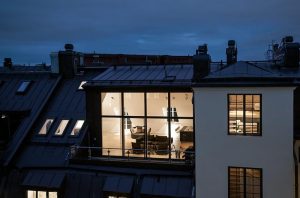 Your new apartment may not come with window blinds, but these are important security and personal privacy features. Blinds prevent people in the opposite buildings from observing what you’re doing and screen many of your valuable possessions. Make sure your blinds are down whenever accessing your safe (or hiding spots) or whenever handling obviously valuable items. For example, don’t clean guns or work on your coin collection in full view of your windows. In large cities window watching is a popular hobby, so always assume someone is watching you through a telescope. This is particularly true at night when looking into a well-lit apartment is much easier. Blinds deprive your enemy of intelligence, use them.
Your new apartment may not come with window blinds, but these are important security and personal privacy features. Blinds prevent people in the opposite buildings from observing what you’re doing and screen many of your valuable possessions. Make sure your blinds are down whenever accessing your safe (or hiding spots) or whenever handling obviously valuable items. For example, don’t clean guns or work on your coin collection in full view of your windows. In large cities window watching is a popular hobby, so always assume someone is watching you through a telescope. This is particularly true at night when looking into a well-lit apartment is much easier. Blinds deprive your enemy of intelligence, use them.
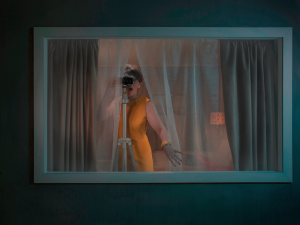 Another thing you should consider is a dedicated security system. They work exactly like home systems but are much less complex because apartments have fewer portals of entry. As a result, they are much more affordable than full home systems and usually work out to less than $20 per month for a monitored system. Before you decide to do this, check with your building owner because there may already be a security company with resources in the building and may save you money. Also, check with your insurer to see if they offer discounts for specific security companies. The system may end up paying for itself through reduced renter insurance premiums.
Another thing you should consider is a dedicated security system. They work exactly like home systems but are much less complex because apartments have fewer portals of entry. As a result, they are much more affordable than full home systems and usually work out to less than $20 per month for a monitored system. Before you decide to do this, check with your building owner because there may already be a security company with resources in the building and may save you money. Also, check with your insurer to see if they offer discounts for specific security companies. The system may end up paying for itself through reduced renter insurance premiums.
The last thing is something I hope you never have to use: Renter’s Insurance. This is inexpensive coverage of your belongings in case something is stolen or is damaged by fire or flood (usually resulting from a burst pipe). If you enact this, it means you’ve already suffered a loss but at least you’ll be partially reimbursed. Renter’s insurance is only a couple hundred dollars a year and is money well invested if the unthinkable ever occurs.
Day-to-Day Apartment Living
Hardening up your apartment isn’t all you can do to reduce your risk. You should get to know your neighbors at least casually. Greet them by name whenever possible and do neighborly stuff, loan them a cup of sugar, bake them a plate of cookies, whatever it takes. Who knows, they might even become friends. Your goal should to at least establish a strong enough relationship so that if they hear you screaming for help in the middle of the night, they’ll come to your aid. Unfriendly neighbors won’t do that.
The entire apartment complex is part of your security system and the objective is to stop intruders as far from your front door as possible. Think of it as a virtual extension of your property line. Whenever you see suspicious people or activity, report it to security and let them do their job. If you notice broken windows, doors that won’t close, burned out light bulbs, or anything else that threatens or reduces your virtual border, report it. Fortunately most apartments have suggestion boxes, so you won’t have to appear like a complainer. Just write down the problem and drop it in the suggestion box. Consider correcting some of the problems yourself (to your own advantage naturally). If you notice a low wattage bulb in your hallway has burned out, spend a couple of dollars and replace it with a higher wattage bulb to improve your visibility at night. If you notice a fire door propped open with a soda brick, close the door and carry the brick away to dispose of it somewhere else instead of just dropping it. Why make it easy for someone put it back?
 The final thing is a way of life: operational security, or OPSEC. Please read that portion in the home security section. Apartment living means everyone can see and hear you most of the time. Being curious, they want to know more about you, especially if you reveal some interesting trait, habit or belonging. A flashy or opulent lifestyle in an apartment setting will cause resentment and quickly identify you as a target. In that tight community, rumors – both true and false – grow and spread in the blink of an eye. The less people know about you, your schedule and your security, the less vulnerable you will be. Share only the information that you absolutely have to. Keep the rest to yourself.
The final thing is a way of life: operational security, or OPSEC. Please read that portion in the home security section. Apartment living means everyone can see and hear you most of the time. Being curious, they want to know more about you, especially if you reveal some interesting trait, habit or belonging. A flashy or opulent lifestyle in an apartment setting will cause resentment and quickly identify you as a target. In that tight community, rumors – both true and false – grow and spread in the blink of an eye. The less people know about you, your schedule and your security, the less vulnerable you will be. Share only the information that you absolutely have to. Keep the rest to yourself.
Stay safe. Stay Legal.
Bosnianbill